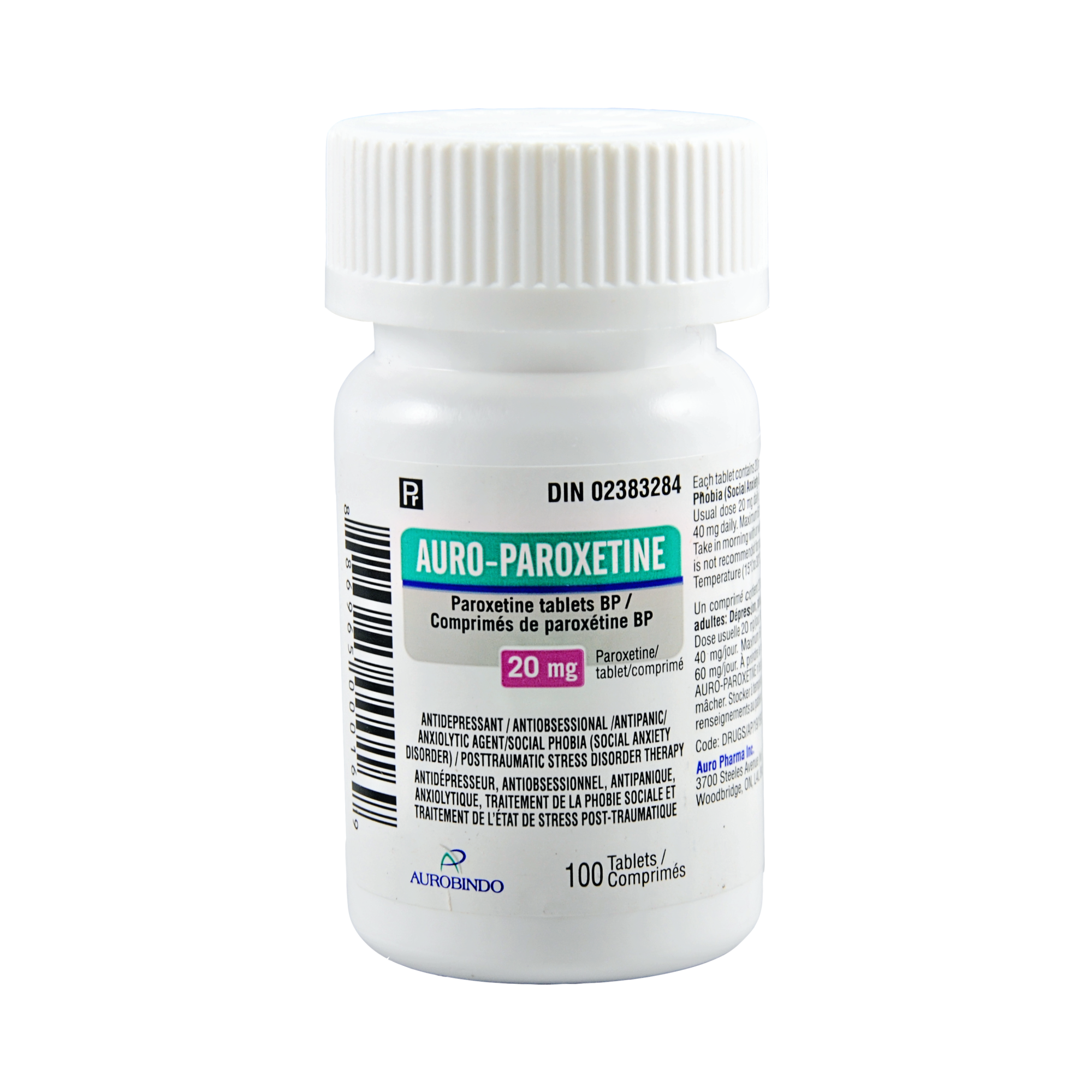What the medication is used for:
PAROXETINE has been prescribed to you by your doctor to relieve your symptoms of:
- depression (feeling sad, a change in appetite or weight, difficulty concentrating or sleeping, feeling tired, headaches, unexplained aches and pain)
- panic attacks
- social phobia (social anxiety disorder) – avoidance and/or fear of social situations
- generalized anxiety or nervousness
- obsessive compulsive disorder (recurrent and intrusive thought, feeling, idea or sensation; recurrent pattern of behavior, or unwanted thoughts or actions), or
- posttraumatic stress disorder (anxiety following a traumatic event, for example a car crash, physical assault, natural disaster such as an earthquake)
What it does:
PAROXETINE belongs to the family of medicines called selective serotonin reuptake inhibitors.
PAROXETINE is thought to work by increasing the levels of a chemical in the brain called serotonin (5-hydroxytryptamine).
When it should not be used:
Do not use PAROXETINE if you are:
- allergic to it or any of the components of its formulation (see list of components at the end of this section).
- currently taking or have recently taken monoamine oxidase inhibitor (MAO) antidepressants (e.g. phenelzine sulphate, moclobemide) or linezolid, a MAO inhibitor antibiotic.
- currently taking or have recently taken thioridazine or pimozide.
What the medicinal ingredient is:
Paroxetine hydrochloride.
What the nonmedicinal ingredients are:
Non-medicinal ingredients include anydrous lactose, hydroxypropyl cellulose, hydroxypropyl methylcellulose, magnesium stearate, polyethylene glycol, sodium starch glycolate, titanium dioxide, and the following colouring agents all extended on an aluminum substrate: D&C yellow #10 and FD&C yellow #6 (10 mg tablets only), D&C red #30 (20 mg tablets only), and FD&C blue #2 (30 mg tablets only).
What dosage forms it comes in:
PAROXETINE is available as tablets containing 10 mg (yellow), 20 mg (pink) and a 30 mg (blue) paroxetine (as paroxetine hydrochloride).
WARNINGS AND PRECAUTIONS:
During treatment with these types of medications it is important that you and your doctor have good ongoing communication about how you are feeling.
PAROXETINE is not for use in children under 18 years of age.
Changes in Feelings and Behaviour:
It is important that you have good communication with your doctor about how you feel. Discussing your feelings and treatment with a friend or relative who can tell you if they think you are getting worse is also useful.
Some patients may feel worse when first starting or changing the dose of drugs such as PAROXETINE. You may feel more anxious or may have thoughts of hurting yourself or others, especially if you have had thoughts of hurting yourself before. These changes in feelings can happen in patients treated with drugs like PAROXETINE for any condition, and at any age, although it may be more likely if you are aged 18 to 24 years old. If this happens, see your doctor immediately. Do not stop taking PAROXETINE on your own.
Taking PAROXETINE may increase your risk of breaking a bone if you are elderly or have osteoporosis or have other major risk factors for breaking a bone. You should take extra care to avoid falls especially if you get dizzy or have low blood pressure.
Medicines like PAROXETINE may affect your sperm. Fertility in some men may be reduced while taking PAROXETINE.
BEFORE you use PAROXETINE tell your doctor or pharmacist:
- all your medical conditions, including a history of seizures, liver or kidney disease, heart problems
- any medications (prescription or non prescription) which you are taking or have recently taken, especially monoamine oxidase inhibitor antidepressants (e.g. phenelzine sulphate, moclobemide) or any other antidepressants, thioridazine, pimozide, drugs used to prevent fits (anticonvulsants), drugs for Parkinson’s disease, or drugs containing tryptophan
- if you are taking tamoxifen (used to treat breast cancer);
- if you have ever had any allergic reaction to medications, food, etc.
- any natural or herbal products you are taking (e.g. St. John’s Wort)
- if you are pregnant or thinking about becoming pregnant, or if you are breast feeding
- your habits of alcohol and /or street drug consumption;
- if you drive a vehicle or perform hazardous tasks during your work
- if you had a recent bone fracture or were told you have osteoporosis or risk factors for osteoporosis.
- If you have a bleeding disorder or have been told that you have low platelets
- If you have glaucoma or increased pressure in your eyes
Effects on Pregnancy and Newborns:
As stated above, ask your doctor or pharmacist for advice before taking any medicine including PAROXETINE. If you are already taking/using PAROXETINE and have just found out that you are pregnant, you should talk to your doctor immediately. You should also talk to your doctor if you are planning to become pregnant.
Taking PAROXETINE in early stages of pregnancy:
Some studies have suggested an increased risk of birth defects particularly heart defects, in babies whose mothers received paroxetine in the first few months of pregnancy. These studies found that about 2 in 100 babies (2%) whose mothers received paroxetine in early pregnancy had a heart defect, compared with the normal rate of 1 in 100 babies (1%) seen in the general population. Also, in cases where paroxetine has been used, there have been reports of premature births although it is not known if these premature births are due to the use of paroxetine.
Taking PAROXETINE in later stages of pregnancy:
Possible complications at birth (from taking any newer antidepressant, including PAROXETINE):
Post-marketing reports indicate that some newborns whose mothers took an SSRI (selective serotonin reuptake inhibitor) or other newer anti-depressant, during pregnancy have developed complications at birth requiring prolonged hospitalization, breathing support and tube feeding. Reported symptoms included feeding and/or breathing difficulties, seizures, tense or overly relaxed muscles, jitteriness and constant crying.
In most cases, the newer antidepressant was taken during the third trimester of pregnancy. These symptoms are consistent with either a direct adverse effect of the anti-depressant on the baby, or possibly a discontinuation syndrome caused by sudden withdrawal from the drug. These symptoms normally resolve over time. However, if your baby experiences any of these symptoms, contact your doctor as soon as you can.
Persistent Pulmonary Hypertension (PPHN) and newer antidepressants, including PAROXETINE:
The use of PAROXETINE during pregnancy, particularly during late pregnancy, may increase the risk of a serious lung condition called persistent pulmonary hypertension of the newborn (PPHN) that causes breathing difficulties in newborns soon after birth. In the general population, PPHN is known to occur in about 1 or 2 per 1000 newborns but this may be increased 4 to 6 times in babies whose mothers used paroxetine during late pregnancy.
If you are pregnant and taking an SSRI, or other newer antidepressants, you should discuss the risks and benefits of the various treatment options with your doctor. It is very important that you do NOT stop taking these medications without first consulting your doctor.
Angle-closure Glaucoma:
PAROXETINE can cause an acute attack of glaucoma. Having your eyes examined before you take PAROXETINE could help identify if you are at risk of having angle-closure glaucoma. Seek immediate medical attention if you experience:
- eye pain
- changes in vision
- swelling or redness in or around the eye
INTERACTIONS WITH THIS MEDICATION:
Do not use PAROXETINE if you are taking or have recently taken (within the last 2 weeks) monoamine oxidase inhibitors, methylthioninium chloride (methylene blue), thioridazine, or pimozide.
You should tell your doctor if you are taking or have recently taken any medications (prescription, non-prescription or natural/herbal), especially:
- other antidepressants, such as SSRIs and certain tricyclics
- other drugs that affect serotonin such as, lithium, linezolid, tramadol, tryptophan, St. John’s Wort, triptans used to treat migraines
- certain medicines used to treat pain, such as fentanyl (used in anaesthesia or to treat chronic pain), tramadol, tapentadol, meperidine, methadone, pentazocine
- tamoxifen, which is used to treat breast cancer or fertility problems
- certain medicines used to treat patients with irregular heart beats (arrhythmias)
- certain medicines used to treat schizophrenia
- certain medicines used to treat bipolar depression, such as lithium
- a combination of fosamprenavir and ritonavir, used to treat Human Immunodeficiency Virus (HIV) infection
- procyclidine, which is used to treat Parkinson’s Disease or other movement disorders
- metoprolol, which is used to treat high blood pressure and angina
- certain medicines which may affect blood clotting and increase bleeding, such as oral anti-coagulants (e.g. warfarin, dabigatran), acetylsalicylic acid (e.g. aspirin) and other non-steroidal anti-inflammatory drugs (e.g. ibuprofen)
- certain medicines used to treat epilepsy
- in general, drinking alcoholic beverages should be kept to a minimum or avoided completely while taking PAROXETINE.
- certain medicines used to treat cough, such as dextromethorphan
PROPER USE OF THIS MEDICATION:
Usual dose:
- It is very important that you take PAROXETINE exactly as your doctor has instructed. Generally most people take between 20 mg to 40 mg of PAROXETINE per day for depression, obsessive-compulsive disorder, panic disorder, social phobia (social anxiety disorder), generalized anxiety disorder and posttraumatic stress disorder; although your doctor may start you at 10 mg per day for panic disorder.
- Take your tablets in the morning, preferably with food. You should swallow the tablets whole with water. Do not chew them.
- You should continue to take your medicine even if you do not feel better, as it may take a number of weeks for your medicine to work.
- Keep taking your tablets, as instructed, until the doctor tells you to stop
- Talk to your doctor before you stop taking your medication on your own.
Remember: This medicine has been prescribed only for you. Do not give it to anybody else, as they may experience undesirable effects, which may be serious.
Missed Dose:
If you forget to take your tablet in the morning, take it as soon as you remember. Take your next dose at the normal time the next morning, then carry on as before. Do not try to make up for a missed dose by taking a double dose the next time.
Overdose:
If you have taken a large number of tablets all at once, contact your doctor or the nearest hospital emergency department immediately, even though you may not feel sick. Show the doctor your pack of tablets.
In case of drug overdose, contact a health care practitioner, hospital emergency department or regional Poison Control Centre immediately, even if there are no symptoms.
SIDE EFFECTS AND WHAT TO DO ABOUT THEM:
Like all medications, PAROXETINE can cause some side effects. You may not experience any of them. For most patients these side effects are likely to be minor and temporary. However, some may be serious. Some of these side effects may be dose related. Consult your doctor if you experience these or other side effects, as the dose may have to be adjusted.
If you experience an allergic reaction (including skin rash, hives, swelling, trouble breathing) or any severe or unusual side effects, stop taking the drug and contact your doctor immediately.
The most common side effects of PAROXETINE are:
- nausea/vomiting
- dry mouth
- drowsiness
- weakness
- dizziness
- sweating
- tremor
- nervousness
- feeling agitated
- blurred vision
- sleep disturbances
- weight gain
- sexual problems
- Although psychiatric disorders are often associated with decreases in sexual desire, performance and satisfaction, treatment with this medication may lead to further decreases.
Other effects may include loss of appetite, constipation, diarrhea, abnormal dreams (including nightmares), headache and menstrual period disorders (including heavy periods, bleeding between periods and absence of periods).
PAROXETINE does not usually affect people’s normal activities. However, some people feel sleepy while taking it, in which case they should not drive or operate machinery.
PAROXETINE may raise cholesterol levels in some patients.
Discontinuation Symptoms
Contact your doctor before stopping or reducing your dosage of PAROXETINE. Symptoms such as dizziness, light-headedness, nausea, vomiting, agitation/restlessness, anxiety, sweating, headache, sleep disturbance, electric shock sensations, tinnitus (buzzing, hissing, whistling, ringing or other persistent noise in the ears) and other symptoms have been reported after stopping treatment, reducing the dosage of paroxetine, or when a dose is missed. These symptoms usually disappear without needing treatment. Tell your doctor immediately if you have these or any other symptoms. Your doctor may adjust the dosage of PAROXETINE to alleviate the symptoms.
Effects on Newborns
Some newborns whose mothers took an SSRI (Selective Serotonin Reuptake Inhibitor) or other newer antidepressant, such as paroxetine, during pregnancy have shown such symptoms as breathing and feeding difficulties, jitteriness, and constant crying. If your baby experiences any of these symptoms, contact your doctor as soon as you can.


 Flexible dosing. Take daily for spontaneous sex or 4 hours before sex.
Flexible dosing. Take daily for spontaneous sex or 4 hours before sex.




